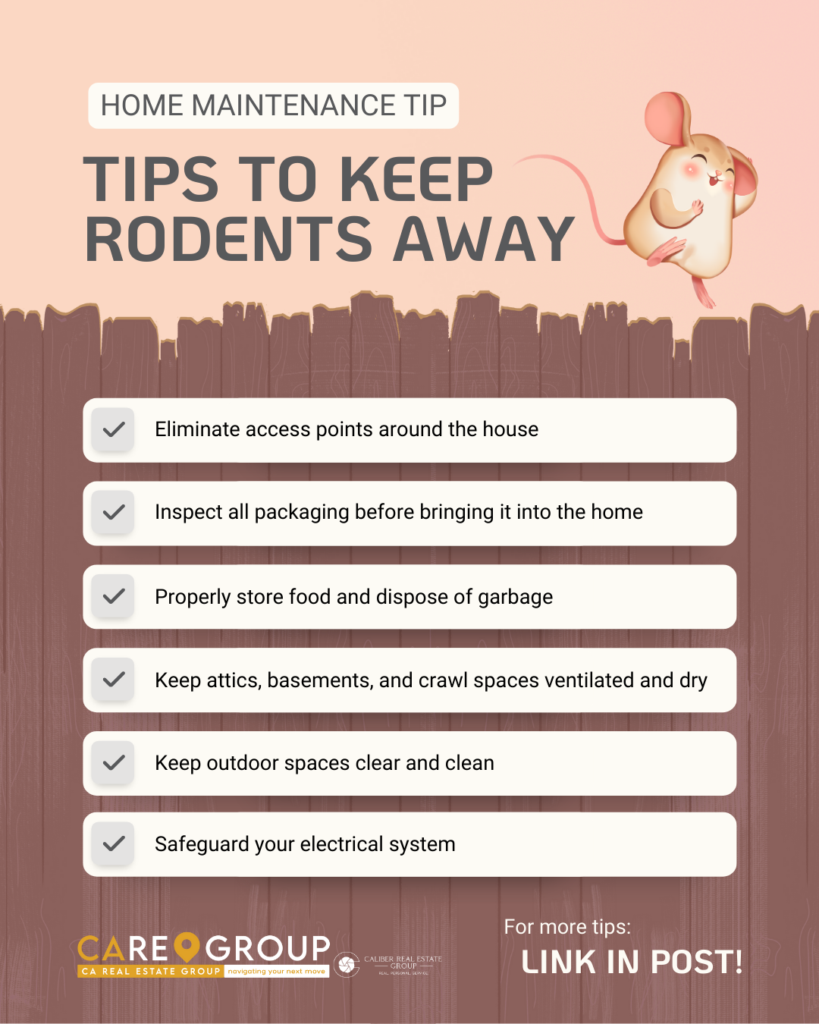Realtor.com | Aug 13, 2022
Here’s an informational tidbit you probably don’t want to hear: As temperatures drop, many rodents will be attracted to your home for the same reasons you are: They’re seeking a warm, cozy shelter with food. And they’re not just creepy—left unchecked, these pests can wreak havoc on your health and home.
“Although they may be small in size, rodents can cause big problems for homeowners once inside. Known to spread more than 35 diseases worldwide, rodents are considered one of the most dangerous public health pests in America,” says Jim Fredericks, chief entomologist for the National Pest Management Association. “In addition to the health threats they pose, rodents are capable of causing significant property damage.”
For example, if they get behind the walls of your home, they can chew through materials like plastic, wood, and drywall. They’re also capable of chewing through wiring, increasing the risk of electrical fire.
While rodents pose a threat year-round, Fredericks says mice and rats invade an estimated 21 million U.S. homes each winter. To keep them from running rampant on your property, put these tips into practice.
Eliminate access points around the house
Mice can squeeze through openings as small as the size of a dime, and their rat cousins can fit through holes the size of a quarter, experts say. This means even the tiniest cracks and crevices should be sealed, including cracks and holes inside and outside the home.
“It’s critical to eliminate access points by inserting door sweeps, repairing damaged window and door screens, sealing exterior cracks, and replacing loose mortar,” says Fredericks. “Any gap under a door that is larger than a quarter-inch can permit mice to enter and should be closed by repairing thresholds or installing door sweeps.”
Openings to chimneys should be regularly inspected, including the damper, which should always be closed when not in use, says Kevin Busch, vice president of operations at Mr. Handyman.
“Inspect and repair holes in your gutters, roof, fascia, siding, and foundation,” Busch says.
The best materials to use for sealing cracks and holes in your home’s exterior? Busch says expanding foam insulation, caulking, metal screening, or even a small piece of sheet metal will work great.
Inspect all packaging before bringing it into the home
With the ongoing coronavirus pandemic, more people are relying on online ordering for groceries, household supplies, and meal delivery. This cardboard packaging can be enticing to rodents searching for food and, as gross as it sounds, give them a free ride into your home.
“If packages with food are left outside for extended periods of time, they can attract mice and rats who can easily chew through cardboard boxing,” says Fredericks. “Be sure to promptly bring any deliveries inside and inspect packages for signs of rodent damage, or even an infestation inside the box itself.”
Properly store food and dispose of garbage
Critters are always looking for their next meal. Experts suggest storing food in airtight containers, disposing of garbage regularly, and using a sealed trash receptacle to prevent hungry rodents from getting into your food waste.
“Sealing up food and properly storing it is important because the odors attract unwanted animals,” says Craig Gjelsten, vice president of operations for Rainbow International. “Mice, rats, and other pests are attracted to rotting food and animal waste products.”
Keep attics, basements, and crawl spaces ventilated and dry
Eliminating any sources of moisture—including repairing leaking pipes and clogged drains—can help keep rodents at bay.
“Just like humans, rodents need water in order to survive,” says Fredericks. “In general, it’s a good idea to eliminate sources of moisture inside your home by keeping attics and basements well-ventilated while also repairing any leaking pipes or clogged drains.”
Keep outdoor spaces clear and clean
To keep unwanted critters from entering your home, be sure to do regular landscaping and yard maintenance.
“Trim back trees so animals can’t climb onto the roof,” says Josh Sevick, president of The Ground Guys, which specializes in lawn care and landscaping.
Sevick also says to remove debris around your home and to keep firewood at least 20 feet from your house.
Safeguard your electrical system
Rodents have been known to chew through structural components like drywall, insulation, lumber, and electrical wiring. While all these threats are worth addressing, ignoring damage to your electrical system can be the most critical because it can lead to unnecessary fires, personal injuries, and property damage.
“While finding evidence of damaged wiring can be extremely difficult, if rodents are present in your home or business, you’ll have a few chewed wires,” says Josh McCormick, vice president of operations for Mr. Electric.
He says to pay attention to red flags like rodent droppings, skeletons, or noises of scurrying or banging in your walls. Evidence of rodent activity could also include loose pieces of insulation, damaged wires, or holes in walls.
“If you suspect or discover a rodent problem, contact a licensed pest control professional immediately,” says Fredericks.
Anayat Durrani is a freelance education reporter for U.S. News and World Report. Her work has been featured in Military Officer, California Lawyer, the American Scholar, and PracticeLink magazines.



